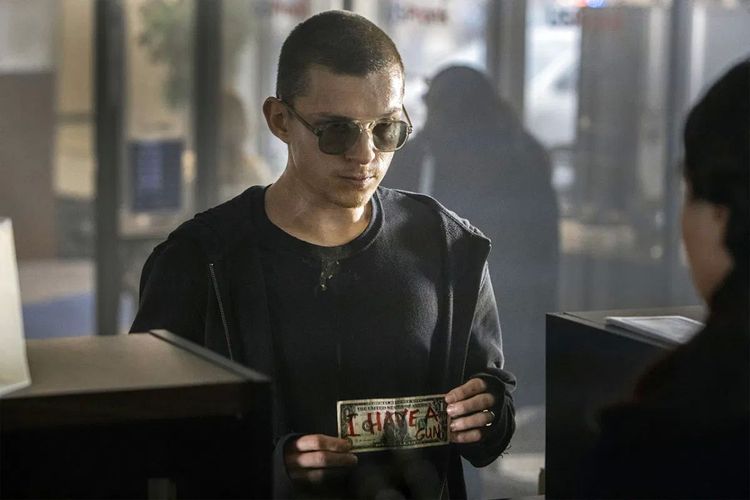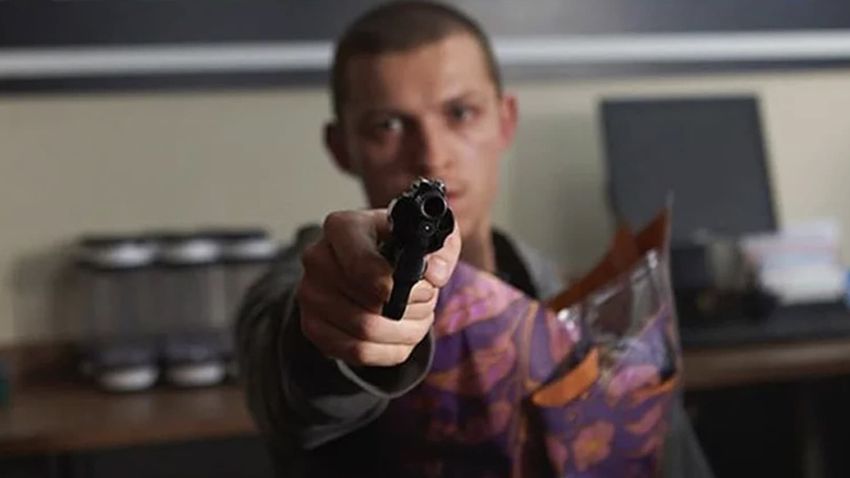Cherry is an epic and sobering tale of a misfit-turned-war veteran-turned outlaw, who is demonised by his PTSD and free falls through the horrors of opioid addiction and performs heists to fuel his dependency. Tom Holland plays our protagonist, whilst Ciara Bravo is our supporting actor who gets entangled in her husband’s crisis.
Directors, Anthony and Joe Russo (Avengers: Endgame, Infinity War) quickly suck audiences into the character’s world. For the most part, it has our attention in a jaw lock (a third act that wallows a bit too much, overstaying its welcome) as we witness the whirlwind of tragedy contaminating the lives of our characters. It’s a rollercoaster of an experience and wildly entertaining. Holland delivers a powerful performance, graduating from the superhero, tight-suit genre promisingly. With Bravo’s performance thrown into the equation, we quickly latch onto the characters’ decaying romance and are thoroughly invested.
At its nucleus, Cherry targets some solemn, ambitious themes and voices some political comments, illustrating their dramatic ramifications. We are pushed through the film’s skeleton with our misguided protagonist through the betrayal of the military, the ensuing silenced horrors of PTSD and washed up effects of dehumanisation and disassociation; being victimised by the wrath of the opiate crisis, turning to criminal activities and generally falling through the cracks, the execution of its subject material is hard-hitting and unflinching, especially in its depiction of the military’s unsavoury ego.

From a directorial perspective, the Russo Brothers effectively put us behind the eyes of our protagonist. The portrayal of his alienation from the world, whether it may be silhouetted bankers rejecting him with disembodied voices or all of his uncanny-looking colleagues at work coming from the same bloodline, is captured creatively and as audiences, we are won over. Similarly, in the first act, the hyper-colourised sequences represent a poignant comment on the vision of nostalgia, mummified with an aesthetic that’s doused in gloss. The slightly slow-mo movements, the muffling of background clatter, the blurring of the peripherals and dream-like score rings louder and glistens further for those through the looking glass of a crippling addiction.
However, throughout Cherry, we are hit with ambivalence over how the story’s substance is decorated in such an artificial aesthetic. With the Russo Brothers’ victory in wrapping up the Avengers franchise with a bang, its confetti has drifted over into their next project here, resembling some heavy political issue arrows being fired from hipsters. Simply put, the project is over-directed and over-polished, resulting in a vain film that loves itself just a bit too much. Consequently, the film’s loyalty to its subject matter and the authenticity that it delivers comes into question. By choosing to topple in favour of its envisioned aesthetic, in its battle scenes, for example, it falls on its own sword. The perfectly stable boom that sways through the battlefield in a single take illuminating different perfectly choreographed frenzies makes us feel like we’re watching a multimillion-dollar, highly stressful Hollywood film set, rather than immersed and lost in the chaos of the battlefield. Similarly, it feels like at times it overcooks its drama, resulting in some overly theatrical sequences that are impaled by redundancy and some tough drug depiction that assassinates expected discretion, ultimately endangering itself as a gimmick.
By puffing out its chest over its aesthetic, it fails to delegate merit and intelligence towards the unfolding of its narrative, leaving us knowing what’s around every corner with predictable plot points. In its defence, its success in executing its biblically sized story (that we are constantly reminded about with disruptive frames bookmarking which act we are entering) is well ironed out in its sequencing that moves with a brazen pace. However, this is done at the expense of an overly comfortable voice-over narration that carries the delivery of the narrative on its back for the entire journey.
Image Credit: Empire

